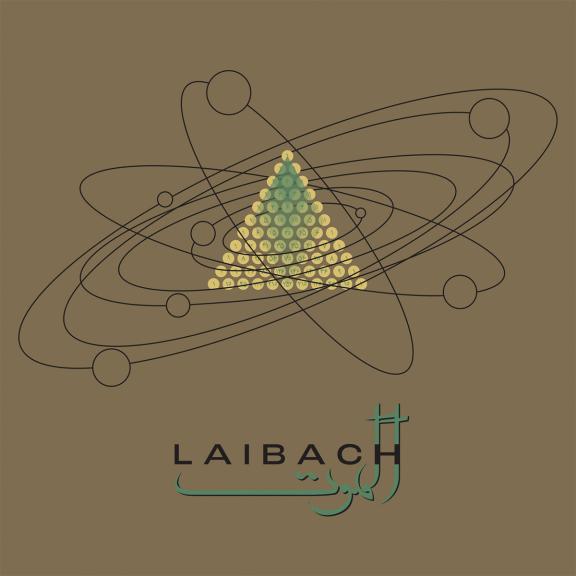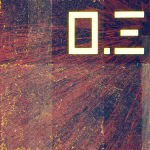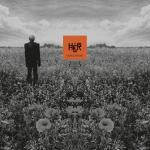Since Krst Pod Triglavom in 1987, Laibach have been staging multimedia shows on historical subjects. In 2022, the Slovenian collective worked with the International Heiner Müller Society on Wir Sind Das Volk! based on texts by the East German playwright, with a very sombre result (review). Released this year, Alamut is in the same vein: this time, it's a show based on the book Alamut by Slovenian novelist Vladimir Bartol, written in the 20th century about the Ismaili sect of Hassan Ibn Sabbâh in 11th-century Iran; a link between Slovenia and Iran, then.
What is immediately surprising, however, is the extent of the Iranian-Slovenian collaboration on this project, which extends far beyond Laibach! The compositions are by Luka Jamnik, one of the members of the group who joined at the time of Volk, but also by Iranian composers Nima A. Rowshan and Idin Samimi Mofakhamb. In addition to the indestructible Milan Fras on vocals, there are several musicians who played on Laibach's last albums, on guitar, drums and keyboards, as well as the RTV Slovenia Symphony Orchestra led by the Iranian conductor Navid Gohari who also added his own touch to some of the compositions. The band and orchestra are also accompanied by the accordions of AccordiOna, a group of women from Slovenia, Croatia and Italy, as well as the Teheran choir Human Voice Ensemble and the Slovenian women's choir Gallina... Alamut is a very, very big project, so big that it makes you dizzy. Getting so many artists from different cultures to work together is a perilous exercise. Fortunately, Laibach seem to know where they're going, and they've all worked under the supervision of Ivan Novak, veteran of the band.
The result is a work totally apart in Laibach's discography, made up of nine tracks spread over two discs - in fact, between them, they take up an hour and a half! With the exception of Fedayeen and War, these tracks are above all symphonic movements, in which the orchestra is at the centre of everything, following compositions that are more reminiscent of the minimalist school of classical music; Laibach has chosen to go all the way by giving pride of place to Iranian composers. A word of warning: people who don't like this music should steer clear, and you shouldn't be allergic to long instrumental tracks either.
This is not to say that Alamut is free of Laibach's familiar tension and sense of oppression - on the contrary. The introduction Overture (Doing the Great human Experiment), which evokes Hassan Ibn Sabbâh's plan to indoctrinate his followers like no one before him, is slow, heavy and grating, and already brings us to a pinnacle of anguish. Fedayeen (The Axe is Sharpened), devoted to the dreaded warriors who would give rise to the legend of the Assassins and among whom the hero of the book Ibn Tahir learns, is a pure piece of industrial music, cold, repetitive and as violent as you could wish for. War (Every Death Brings a New Victory) is a sinister, noisy chaos created by the cacophony of accordions, a sort of sonic Guernica in which everything is turned upside down - after the build-up, however, it proves less striking than expected. The Doors of Perception (Dreams Are Beautiful and Unusually Vivid), finally, is haunted by strange samples and the suffocating human voice, reflecting the use of drugs to control the minds of Ibn Sabbâh's followers.
But Alamut has even more interesting things to offer. We are even more struck by the unreal sweetness of Secret Gardens (It's Love That Weakens the Mighty Lion), about the gardens populated by false houris in which, according to legend, Hassan Ibn Sabbâh made his disciples believe that he had taken them alive to paradise; for our ears, it is the harp and the choirs that perform this miracle. From calm to panic and from panic to lonely melancholy, The Metaverse (Testing Human Blindness to Its Limits), which lasts no less than seventeen minutes, both confuses and seduces us as we learn to tame it. "Beautiful' is rarely the first adjective that springs to mind when one thinks of Laibach's music, yet it is the case here. Last but not least, Milan Fras intervenes at length with his cavernous voice on the two Meditation tracks that end each of the two discs: in long theatrical tirades, he brings Hassan Ibn Sabbâh to life, weaving together lines from Vladimir Bartol's novel and elements of the poetry of Omar Khayyam, who according to legend was his classmate, to explain the nihilist philosophy by which he justified his manipulations and his ferocious Iranian nationalism - his presentation is translated into English in the booklet.
Because, of course, that's what Laibach is primarily interested in in this novel: Vladimir Bartol lived in Trieste in the 1930s, a territory that had long been disputed between Slovenia (successively part of the Austro-Hungarian Empire, the Kingdom of Serbs, Croats and Slovenes and then the Socialist Federal Republic of Yugoslavia) and Italy, and was a contemporary of the rise of Fascism, which he fought; Mussolini's methods of indoctrination and disregard for human life permeate the book, as does the double-edged national issue - for, as a witness to the policy of forced Italianisation carried out in Trieste in the name of Italian nationalism, Bartol was also in the position of an oppressed national minority fighting for its liberation as a Slovene. But the book is more than just a transposition of twentieth-century European issues to the Iranian Middle Ages, since the discourse he lends to Ibn Sabbâh echoes the Iranian nationalist antiphons of his time, which have not really changed since. The booklet provided by Laibach with the double-album is packed with information and points of view, with texts by Bosnian researcher Ahmed Burić, Iranian journalist Ali Ameri and Slovenian musicologist Maia Juvanc, dealing not only with Laibach's artistic work but also with the various historical contexts and relations between East and West; we can't recommend enough that you also read the novel by Vladimir Bartol.
A perilous experiment on an artistic level, Alamut is certainly not for all ears, even among those who appreciate Laibach. Nevertheless, the work is a success, rich and beautiful, a new mirror in which the questions that plague the history of Europe and the Middle East are reflected.





